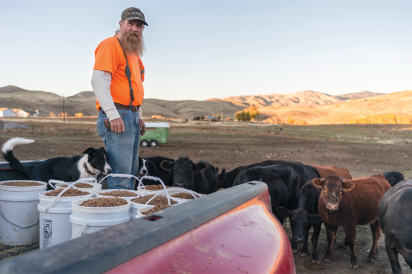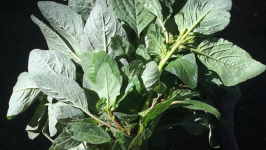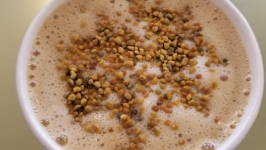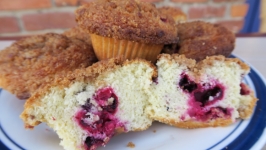Reduce, Reuse, Recycle
The rich, intoxicating scent of freshly brewed beer immediately hits you upon entering County Line Brewing in Garden City. Owner Zack Kiehl and brewer Chris McGinnis have just finished cooking a batch of Barnwood Brown Ale and the wet grain husks and other leftovers of the brewing process emit a warm humidity, reminding one of baking bread. Not a surprise, as both brewers and bakers use grains to make their products.
County Line is one of the smaller breweries in the Treasure Valley, with a seven-barrel system. Yet it generates roughly 1,000 pounds of spent grain each week, depending on what beer they brew and how often. Instead of throwing the wet mush away, Kiehl advertised on Craig’s List and found Sissy Molton.
Nearly all the leftovers are picked up on a regular basis by a family headed by Molton and her partner, Bill Atkinson, who haul County Line’s spent grains to their farm in Horseshoe Bend. They spread this mush onto a field to supplement the grass and hay they typically feed their 90 head of cattle.
Molton said it took her livestock about a week to warm up to eating spent grains. But once they did, they were hooked. “When I first dumped it out there, they just sort of stomped it and nibbled on it. But after two or three times within a week, they took. One of my daughter’s cows knocked me down trying to get to it.”
Kiehl said livestock like the spent grains because they still contain some sugars that the brewing process didn’t fully extract. He suggested that County Line’s likely have more of this residual sweetness than bigger breweries because his operation is relatively inefficient at taking out all those sugars.
Over in Salmon, Nick Bertram, at his namesake brew pub, owns and operates a system that’s about the same size as County Line’s. There, he creates a regular slate of beers ranging from pale ale to stout and seasonal choices, such as last summer’s Total Eclipse IPA. Also, like County Line, Bertram’s spent grains are given to local residents.
Tom Ford feeds Bertram’s Salmon Valley Brewing leftovers to his Red Wattle/Large Black cross pigs. The docile pigs with oversized ears do well on their clover and alfalfa pasture, which Ford supplements with the grains. He doesn’t know whether or not they contain any alcohol, but when he feeds them the mush, “the pigs act like people drinking a beer. They get happy, run around and play, and then lie down and take a nap.”
But the pigs aren’t drunk. Chris Swersey, supply chain specialist with the Brewers Association, settled the matter with an explanation: “When fresh, brewers’ grains contain some fermentable sugar, protein and fiber. When they age, they acidify via the activity of lactobacillus.” Ford’s pigs must just be showing him how happy they are to get one of their favorite foods.
But the pleasure isn’t limited to farm animals: At Odd Fellows’ Bakery, across Main Street from Bertram’s Brewery, residents of the Central Idaho town know to arrive early if they want a loaf of Brewers’ Bread. Craig McCallum creates the dark and hearty loaves with Bertram’s spent grains. A regular buyer describes the bread as chewy with the rich smell of brewing mash.
Besides feeding livestock and baking bread, spent grains are being experimented with by fungi cultivators. Chris Verkerk, a Meridian fireman, and his partner in the project, Cheryl Mendiola, are working with a small batch of County Line’s leftovers in an attempt to grow mushrooms.
Mendiola is in charge of germinating the spores in Ball jars, while Verkerk is rounding up the necessary materials, including spent grains, wood chips, coffee grounds and cardboard boxes, to produce the Garden Giant variety, also known as Wine Cap or King Stropharia, in a corner of his one-acre home/farm. Although they’re just starting out, they hope to have fully grown mushroom “fruits” sometime in 2018.
Other reported uses for spent grains include baking dog biscuits and energy bars (for people), and even generating electricity via a steam boiler devised by Alaskan Brewing Company, which became operational in 2012.
Kiehl, who grew up on a small family farm in Star, waxes philosophical about the “cycle of life” that began with simple grains on a farm. He said breweries benefit by not having to pay to dispose of spent grains while those who raise livestock, cultivate mushrooms or bake bread benefit by not having to pay for feed or primary ingredients. It all comes full circle, he said, as the spent grains may eventually end up in the soil as fertilizer from cows or pigs—which may, in turn, help raise other crops.









